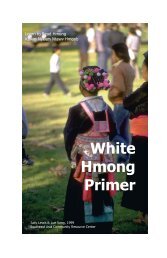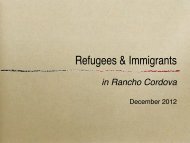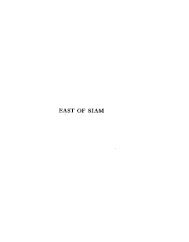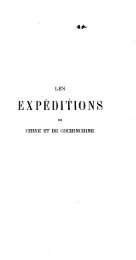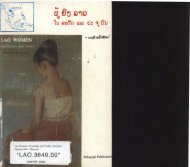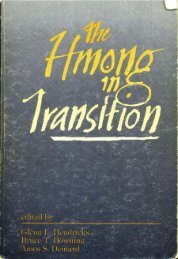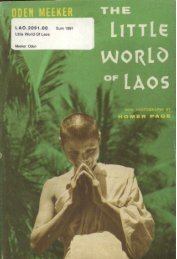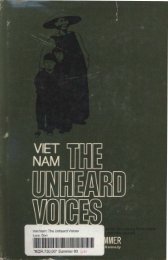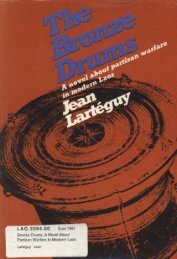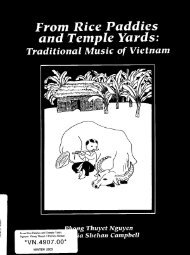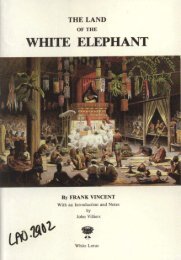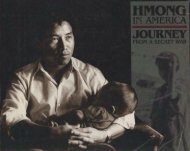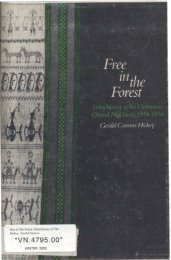PEOPLE
Grant, The Boat People - Refugee Educators' Network
Grant, The Boat People - Refugee Educators' Network
- No tags were found...
Create successful ePaper yourself
Turn your PDF publications into a flip-book with our unique Google optimized e-Paper software.
Thc Bwt People<br />
1<br />
demand, particularly from church groups and specially formed<br />
interest groups, to take more Indo-Chinese refugees, a demand the<br />
government is finding increasingly difficult to resist. New<br />
Zealanders seem to appreciate that, in this caw, as a near ncighbwt,<br />
their country has special responsibilities.<br />
Until mid-1977 most of the Viemamew settled in New Zealand<br />
had been associated with the country during the Victnam war, such<br />
as embassy staff or students granted asylum. Rut in Mmy 1977, the<br />
UNHCR appealed to New Zmlsnd to take some boat people and the<br />
government agreed, provided they held UN status as refugees and<br />
had 'oceupatim qualifieatims useful to New Zealand'.<br />
By January 1978, 535 Indo-Chinese had entercd New Zealand,<br />
mainly in two big airlifts. They were settled largely through the<br />
tffons of the inter-church commission on immigration, the traditional<br />
agent for refugee remlement. The government declined to<br />
more until it had seen how the first groups had settled, By<br />
t&e<br />
October, the inter-church commission had compiled a report outlining<br />
the success of resettlment and recommending an increase. In<br />
Dccembcr, the government announced it would take 600 during<br />
1979, Early in July 1979, rwo brothers, Hugo and Bill Manson, both<br />
expcrienccd television journalists, wrote to all the counay's 230 local<br />
authorities asking them to indicate the willingness of their communities<br />
to support a refugee family. The Mansons suggested a mtio<br />
of one refugee for every thousand citizens, or a total of about 3200<br />
Indo-Chinese. Within two months, with more than hmlf the councils'<br />
replies returned, 80 per cent had indicated support.<br />
Prcssure on the government came from other sources, including<br />
the AN states and New Zealand's ANZUS colleagues, the United<br />
States and Ausmlia. By he timc the Geneva conference was held<br />
in July 1979, the government had agreed r take 3235 refugees {or<br />
one for every 927 of the population), but spread over two yean, 'The<br />
government is being cautious to the point of cruelty,' said Hugo<br />
Manson. Officials defended government policy, arguing that the<br />
qualiry of sponsors, not just the quantity, had to be taken into<br />
account. One official asked: 'What about the African nations? Why<br />
have they not taken any?' The government argued further that its<br />
selection policies were humanitarian: age or youth of refugees was<br />
not a barrier to acceptance and not only skilled people were sought.<br />
A auu'ws approach would create the necessary favowable public<br />
climate.<br />
The only refugee reception ma in New Zealand is at were<br />
in South Auckland, where the newcomers spmd their first month<br />
in medical checks, cultural orientation nnd language coumes. An<br />
experimental community -based rcsmlement program in Rotom,<br />
on Nonh Island, is planned. But there a p m to be growing opinion<br />
that more refugm should be taken and that another reception camp<br />
should be opened. The Mmon brothers may yet have their way.<br />
Nguym Phi, foq-two, with his wife and six children, was put<br />
of Ncw Zealand's h t intake of boat pple. On arrival his only pa+<br />
sessions were the dothea he wore. He had taken a teica camera and<br />
lenses with him from Viemam but had sold them in a Malaysian<br />
refugee camp to buy fd. This war his second time as a refugee.<br />
He had already fled from Hanoi to tfie south in 1955, after the Gencva<br />
agreements. This timc hc was leaving behind the rtsuh of his<br />
succwsful wtlemmt in the south: a house, a car, and nvo ice-m<br />
factorits, employing eighteen people. The main reason for fleeing<br />
was what the Phi family dcsaibe as 'pressure' - such as having to<br />
attend daily meetings organized by the communists, and having to<br />
do 'voluntav' work,<br />
Other refugees dm'hd huw their busintsscs nnd prom were<br />
confiscated. A Saigon man said he had lost a family bakery, a cattle<br />
farm and an orchard in May 1978. He had been sent to a 'new emnomic<br />
zone' where it was too barren to d e P living. A 37-ymr-old<br />
former lieutenant commander in he south Vietnamese navy went<br />
through a 're-education' camp 150 lcilometres north of Saigw, where<br />
work occupied the days, and meetings the evenings. 'The hardest<br />
thing was that we had to denounce our sins and the sins of our<br />
parents and grandparents. We had to denounce them as memben<br />
of the capitalist clwcs!<br />
While New Zealand has den fewer Indo-Chinese refuges than,<br />
according to some of its citizens, it could, all those who have come<br />
have &en wttlrd successfully The government says it how8 no<br />
examples of failure: this in iaclf is a succesr in human terms,<br />
Japan<br />
Since the fall of Saigon, 2860 Indo-Chinese refugees have made




